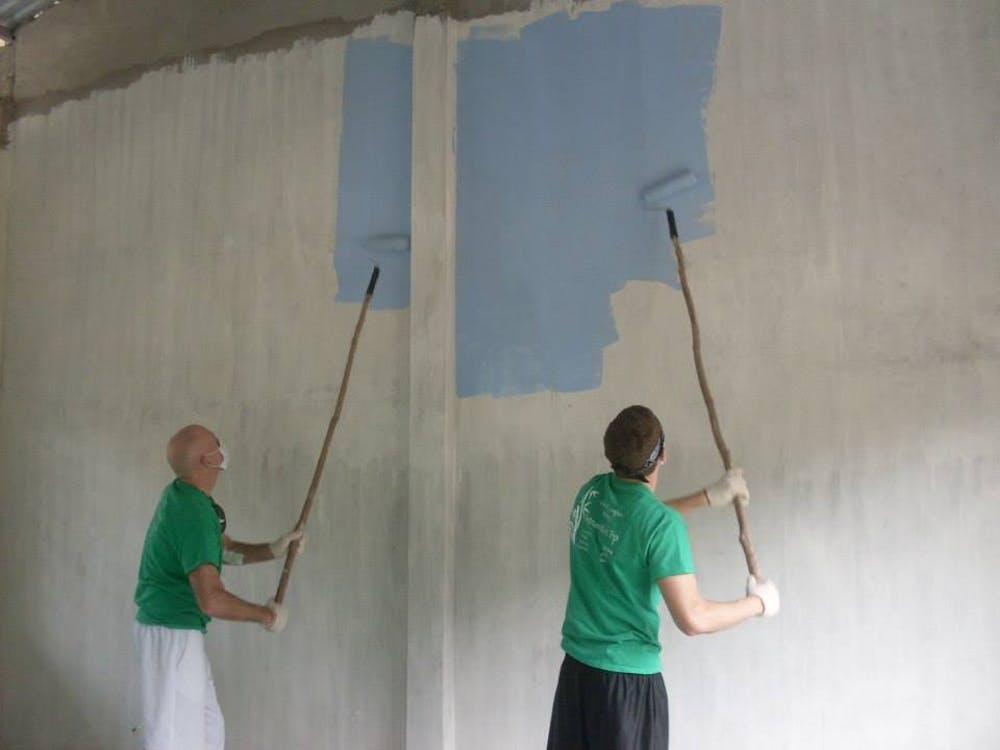The bus, weighing eight tons, traveled down a series of corridors, upon a rural road which had a capacity of less than half the bus’s weight.
Onlookers’ jaws dropped; they could not believe what they were seeing, as the bus barely missed walls, buildings, tree limbs and spider webs—complete with larger-than-average spiders.
Such a scene sounds like a sequence in an action film, but in reality it describes the winter break experience for 12 Shippensburg University students, faculty and alumni.
Members of SU’s United Campus Ministry (UCM) visited southwestern Vietnam for a service trip from Dec. 23, 2013 to Jan. 7, 2014.
In Phong Nam, a small village near Ben Tre City, the capital of the Ben Tre Province, UCM finished construction on a school for Vietnamese students and taught them English.
“We would do things like painting and general cleaning,” said Zachary Metz, an SU student who went on the trip.
“We did a little bit of tile work, put up some new doors in the classrooms—just [got] the classrooms ready for the students to use for the new school year,” he said.
“The other half of the group, they went and met with the English teachers there at the school and we just did a variety of activities with the kids that varied in age from third to fifth grade—working with basic English phrases, and working with words and numbers, and letters,” Metz said.
According to “The Guardian,” a British newspaper, all Vietnamese schools are now required to teach English, with an “intermediate” level of competence expected by 2020. That year, a standardized test will be given to gauge the effectiveness of English teachers over the next few years.
“The students were so incredibly attentive and worked really, really hard to do their best,” said the Rev. Jan, UCM’s advisor.
The children who UCM taught were aged from third through fifth grade.
UCM worked with four members of Young Men’s Christian Association (YMCA), who served as Vietnamese translators.
This was the sixth time SU has sent representatives from UCM to Vietnam, and many individuals who went on the trip in past years still speak to translators, children and host families who they met there. Many who went this time said they would like to do the same.
“Every day I got really close to the head of construction, and although he didn’t speak much English, he was really into trying to make me laugh, all the time,” Metz said.
Elizabeth “Izzy” Erbe, another SU student who went on the trip, said she experienced a moment with a translator and student that brought her to tears.
“When we were leaving the school, one of the little girls that I had gotten really close with—she didn’t speak any English—but I told our translator to tell her, ‘I’m going to miss you,’” she said.
In response, the little girl said, “Remember me”—the first words she had ever spoken in English.
SU student Jenna Holmes said she will always remember “the smile on the kids’ faces, the joy in the community’s eyes, the English teacher asking me to always remember her, the woman who wouldn’t let go of my hand.”
Many of the UCM representatives said they enjoyed the cultural immersion, something they would never have received had they not gone on the trip.
“Going into Vietnam I worried about the reservations that some of the people would have towards us, but after not even 24 hours in Vietnam I knew there was nothing to worry about,” said SU student Brooke Clevenger.
Ben Tre is at the center of the Mekong River Delta, an area with a population of more than 13.5 million people, according to the ASEAN Regional Centre for Biodiversity Conservation. Most of its citizens earn their living through agriculture, farming and fishing.
Some UCM representatives ate snake eggs, snake tail, fried squid and other Southeast Asian delicacies. Nearly all of them raved about fresh Vietnamese fruit.
“When you get deep into the country, there [were] just fields upon fields, and palm trees everywhere,” Erbe said. “I had no words.”
Many UCM representatives said the fact that the United States has had a military-based relationship with Vietnam had a deep impact on them. One of their destinations was the War Remnants Museum, where elements of the Vietnam-American War are on display.
“It was definitely an experience that we probably won’t ever have again—seeing the other side of an enemy in our wars,” Metz said.
Despite this knowledge, however, Clevenger said the Vietnamese people treated UCM with hospitality.
“People welcomed us with open arms even before we told them what brought us to Vietnam,” she said. “Our nation’s past had no impact on how the people of Vietnam looked at us.”
“As we left and were boarding the plane, and on our ride home was one of the hardest things I had to do,” Holmes said.
UCM has plans to make local appearances around the SU campus and Shippensburg community, where representatives hope to encourage people to go on service trips in the future.
“Whether it’s Vietnam, or anywhere else, there’s nothing like expanding your world to
understand the diversity of God’s creation, and the wonders of that,” Bye said, “I think taking the time to build relationships with people is just the most important thing, and we have an opportunity to do that over there, and it’s transforming.”





The Slate welcomes thoughtful discussion on all of our stories, but please keep comments civil and on-topic. Read our full guidelines here.